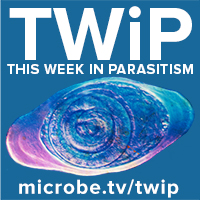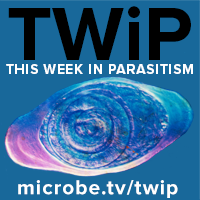The Tremendous Trio solve the case of the Woman With Steatorrhea, and reveal breakdown of the glycocalyx associated with severe and fatal malaria.
The TWiP team solve the case of the Four Year Old with Fever, Headache, and Cough, and discuss the release of extracellular vesicles from Leishmania amazonensis that manipulate the host immune response.
The TWiP peeps solve the case of the Panamanian Mother with Steatorrhea, and reveal new monoclonal antibodies that effectively block malarial infection.
The Podfessors solve the case of the Itchy Child from Panama, and discuss competition for blood in human malaria-helminth co-infections.
The TWIPniks solve the case of the Man With Diarrhea and 100 Micron Objects In Stool, and discuss the reticulocyte receptor for Plasmodium vivax.
The TWiPians solve the case of the Woman With Anemia, Eosinophila, and a Worm in Her Intestine, and discuss a study on the function and druggability of two malarial aspartate proteases.
The TWiPonderers solve the case of the Timber Worker with Severe Shaking Chills, and describe an experimental malaria vaccine comprising attenuated sporozoites produced by genetic engineering.
The TWiPanorama solve the case of the Dutch Woman with Wormy Objects in Her Stool, dissect a study on cytoadhesion of malaria infected red blood cells, and introduce Parasitology Superheroes.
The TWiPinella solve the case of the Woman from Guinea, and describe the use of CRISPR/Cas9 to identify essential apicomplexan genes.
The TWiP troika solve the case of the Female from the Bronx, and reveal how feeding on different plants affects mosquito capacity to transmit malaria.





